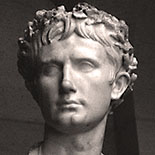 Quintus Horatius Flaccus (December 8, 65 BC – November 27, 8 BC), known in the English-speaking world as Horace, was the leading Roman lyric poet during the time of Augustus (also known as Octavian). The rhetorician Quintillian regarded his Odes as just about the only Latin lyrics worth reading: “He can be lofty sometimes, yet he is also full of charm and grace, versatile in his figures, and felicitously daring in his choice of words.”
Quintus Horatius Flaccus (December 8, 65 BC – November 27, 8 BC), known in the English-speaking world as Horace, was the leading Roman lyric poet during the time of Augustus (also known as Octavian). The rhetorician Quintillian regarded his Odes as just about the only Latin lyrics worth reading: “He can be lofty sometimes, yet he is also full of charm and grace, versatile in his figures, and felicitously daring in his choice of words.”
Horace also crafted elegant hexameter verses (Sermones and Epistles) and caustic iambic poetry (Epodes). The hexameters are amusing yet serious works, friendly in tone, leading the ancient satirist Persius to comment: “as his friend laughs, Horace slyly puts his finger on his every fault; once let in, he plays about the heartstrings”.
His career coincided with Rome’s momentous change from Republic to Empire. An officer in the republican army defeated at the Battle of Philippi in 42 BC, he was befriended by Octavian’s right-hand man in civil affairs, Maecenas, and became a spokesman for the new regime. For some commentators, his association with the regime was a delicate balance in which he maintained a strong measure of independence (he was “a master of the graceful sidestep”) but for others he was, in John Dryden’s phrase, “a well-mannered court slave”.
CARPE DIEM
Horace
Leuconoë, don’t ask, we never know, what fate the gods grant us,
whether your fate or mine, don’t waste your time on Babylonian,
futile, calculations. How much better to suffer what happens,
whether Jupiter gives us more winters or this is the last one,
one debilitating the Tyrrhenian Sea on opposing cliffs.
Be wise, and mix the wine, since time is short: limit that far-reaching hope.
The envious moment is flying now, now, while we’re speaking:
Seize the day, place in the hours that come as little faith as you can.
=======
TREACHEROUS GIRL
Horace
What slender boy, Pyrrha, drowned in liquid perfume,
urges you on, there, among showers of roses,
deep down in some pleasant cave?
For whom did you tie up your hair,
with simple elegance? How often he’ll cry at
the changes of faith and of gods, ah, he’ll wonder,
surprised by roughening water,
surprised by the darkening storms,
who enjoys you now and believes you’re golden,
who thinks you’ll always be single and lovely,
ignoring the treacherous
breeze. Wretched are those you dazzle
while still untried. As for me the votive tablet
that hangs on the temple wall reveals, suspended,
my dripping clothes, for the god,
who holds power over the sea.